This Ocala couple found innovative ways to navigate the personal and professional challenges of the pandemic.
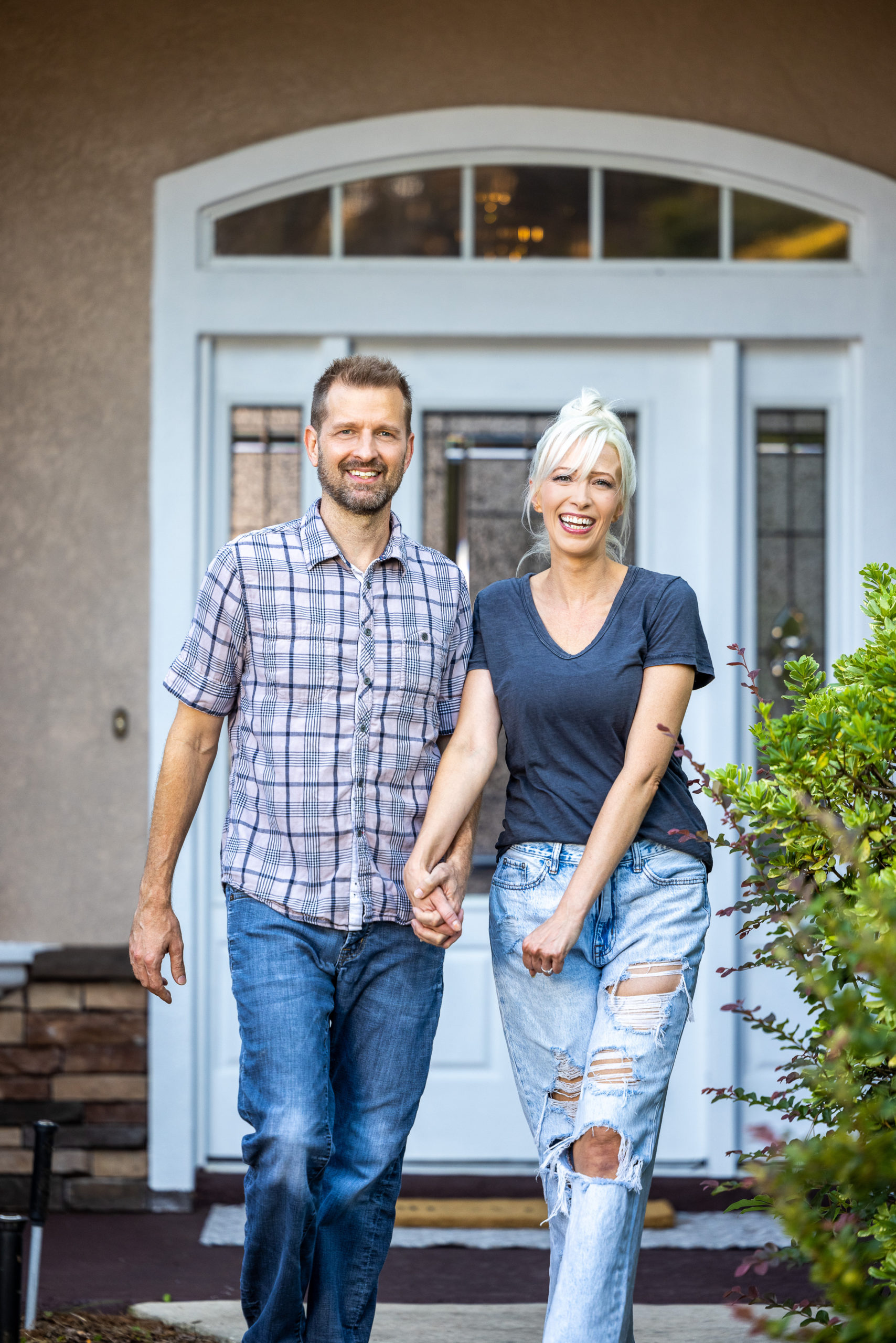
Kuhn and his wife Susie.
At the height of the pandemic, Dr. David Kuhn and his wife Susie, of Trinity Clinic, were in the spotlight. It was an uncomfortable place to be at times and finding calmness in the chaos became vitally important to their quality of life.
From figuring out how to help their patients, loved ones and staff stay healthy in the face of the rampant COVID-19 virus and its variants, to finding themselves in the center of some community drama, the Kuhn’s relied on their varied skills and deep commitment to each other and their community to find a positive path forward.
Through 10 years of marriage and six years working together full-time at the clinic, they have forged new friendships and alliances, discovered new interests and found ways to merge their core values with some of the needs that surfaced during the past couple of years. Now, they are embracing a new normal while looking to the future with renewed zest and enthusiasm.
The couple recently took some time to talk with us about how they came to be in Ocala, their involvement in the community and how they worked to find solutions professionally and personally to help them navigate the challenges of life in a pandemic.
“The Kiss”
Could it have been kismet, given the past couple of years, that Susie and David met because of an influenza virus?
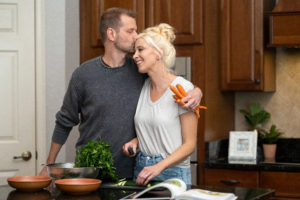
Susie, who is from northern Vermont, double majored in early childhood education and early childhood special education at the University of Vermont before obtaining her master’s degree in education from Lyndon State College. While working on the latter, she became a single mom. David, whose family moved to Ocala when he was 6 months old, completed his undergraduate studies at the University of Florida, went to medical school at American University of the Caribbean, completed clinical rotations in New York City and finished his internal residency training at the University of Mississippi in Jackson.
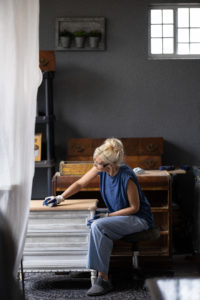
“Too often people get lost on the quest for happiness and success and forget to be grateful for the present moment.” -Susie Kuhn
In 2010, Susie became very ill with the H1N1 virus and did not want to expose her infant son, so she quarantined herself in a motel room. She says it was freezing outside, she could barely breathe between coughs and the television was broken.
“I did have a poor internet connection and remember thinking, why not sign up for a dating website,” she recalls. “I came across his very funny and unexpected profile. We exchanged phone numbers and would talk for hours every night. We shared a mutual love of golf, history, traveling, music, food and the list went on. We had an instant soul connection and joked that it just seemed too good to be true.”
They even feared that when they finally met in person, they would find that they had been catfished, which is a common risk faced by online daters and refers to a deception in which someone creates a fictional persona or fake identity. “We were both leery,” he adds, “but after a few weeks of amazing and meaningful conversation, we decided to finally meet in person.”
“We decided to meet in Boston. Bear in mind, the Craigslist killer was still on the loose and I wanted to meet in a neutral location, where my sister and her fiancé could, unbeknownst to him, stalk us and make sure he really was who he said he was,” Susie shares. “I made the three-hour drive to the city and the entire way I was regretting the pact we had made, that when we met in person we would not say a single word…but instead kiss. The romanticism of the idea slowly transformed into utter fear and, as I saw him standing there for the first time, I drove right past him and around the block! I finally gathered the nerve to park and got out of the car and he was smiling at me. I walked up and head butted him right in the face in my panicked effort to kiss him. It was so embarrassing! We both laughed and I think cried from the pain a little bit. Then he said, ‘Maybe a helmet next time?’”
“She approached me like a gazelle running towards its prey,” he recalls of that first meeting. “Our first contact was a medium force head butt, but eventually our lips found each other and our hearts were soon to follow.” A year later, they met again at the same place and he proposed marriage—she accepted
Coming To Ocala
Susie moved to Ocala with her son Austin in 2012, just a few months before she and David, or “DK” as she sometimes calls him, were married in an intimate ceremony in the Florida Keys with their immediate families, including his son, Max, from a previous marriage.
She says they faced the normal challenges of blending families, along with sharing a home and work life.
“It was nearly 24 hours together for almost six years,” while working together at Trinity Clinic she notes. “I am not sure how we managed to pull that off without a divorce, but we have always made a great team. We share similar visions for the life we want to share and our values are closely aligned. We both have big hearts and helping others is at the core of our beings. I think our ability to share and define the ‘why’ behind the way we choose to live our lives has enabled us to be better equipped to navigate the highs and lows of our personal and professional lives.”
“When Susie joined the team, our clinic was truly elevated to another level,” David asserts. “I can say without hesitation that she truly has the best work ethic of anybody I have ever known in my professional career.”
The Pandemic
In the early months of 2020, people around the world began to learn about COVID-19 and its rapid spread and sometimes fatal implications. Locally, residents wanted to know how it would impact their lives, how prevalent it was in our community and how they might best respond. David was eager to learn all he could—and, more importantly, share what he knew with others.
“If there was a war happening in your neighborhood, you may not want to, or be able to, participate but I believe that most would feel inherently compelled to provide necessary local information so those of the highest risk could make the best and most informed decisions about how to protect themselves and their loved ones,” he offers. “I was not working in the hospitals where the real heroes of the pandemic were forged but I felt it was my duty to make a contribution to our local pandemic response.”
“My husband had been monitoring the situation and we had been bracing for its impact, but I am not sure either of us could have ever anticipated how much it would change our lives,” Susie notes. “Initially, there was so little information available to even the medical community and the lack of resources became an obstacle. Guidelines kept changing as we learned more about the virus and its transmission. DK and Max decided to film our experiences in the clinic in a Facebook series. They wanted to document this major historical event to share with their children and grandchildren.”
One day while David was working late, Susie, who freely admits she has issues with anxiety, says she took an “anxiety-fueled deep dive” into analyzing and graphing data and realized “we were on target for a major spike and outbreak if the trends continued.” From that research, their subsequent presentations on social media became a significant resource for local COVID data.
“I am very proud of the Facebook community culture we helped to curate, particularly given the very polarizing nature of the pandemic locally,” she states. “I feel we allowed individuals to share concerns, ask questions and voice differences of opinion while doing our best to maintain a culture of respect and compassion, which was often absent on other local social media platforms.”
“Not only had we become a very public source of information, but we would spend a great deal of time late into the evenings and nights messaging or on the phone with individuals in our community that were usually not even our patients,” she adds. “We would share resources and information, and even pray with members of our community at night to help keep their spirits up when they were admitted to the hospital or ICU and had no one else to reach out to. I am very open about my struggles with anxiety and being able to be informed about where we stood on a local level and not just on a sensationalized mainstream media level made me feel more in control and make the choices I felt were right for me and my family.”
The Drama
David spent a great deal of energy to ensure that other medical providers in the community had access to resources in the beginning of the pandemic. When the numbers of cases continued to rise locally, he wrote a letter to the Ocala City Council in July 2020 asking the members to pass a face mask mandate and asked fellow health care workers to also sign the letter. In two days, the letter contained more than 500 signatures.
A few weeks later, the city council passed an emergency mask ordinance, at which time Marion County Sheriff Billy Woods told his employees they would not wear masks at work and said visitors to their offices could not wear masks. Woods’ mandate, along with steadily increasing numbers of local cases, landed the sheriff and Marion County in the national spotlight.
As happened in many areas around the nation, such mandates quickly faced legal challenges and also created rifts within communities. “I am not going to discuss the politics of this virus, because the medical community was not discussing politics when they banded together to try to create change and preserve life. I am beyond grateful to every single member of the medical community for their service and for sacrifices they have all made,” Susie states. “It often did feel as though we were at the crossroads of the drama locally. This was the most difficult part of our journey, because if you knew us pre-pandemic, we were both very private people. Suddenly, everybody knew of us, often without truly knowing us, and the mischaracterization or image people created of us was so much more polarizing than I could have ever imagined. It was far more challenging on a personal level for me than I think it was for my husband. My biggest fear was someone was going to target our office or our home. That was when I started to take intermittent breaks from social media to preserve my inner peace. Despite any of the challenges and moments where I may have wanted to throw in the towel, my husband would always remind me of why what we do matters. ‘If we can save one life, it will all be worth it,’” he would say.
David recalls that the early days were mostly learning how to navigate the uncertainty of a pandemic and how to be a voice of reason.
“The more I learned about the behavior of the virus in conjunction with also learning the behavior of our society, my fears diminished and it became easier to help bring a sense of security to the people of Marion County,” he shares. “I think it was important that I was able to be that voice because there was so much misinformation being shared and the political polarization was becoming so ugly. I believe we would serve ourselves better if we had more voices of reason, compassion and understanding to help moderate the extremes and buffer those that spew hate for sport.”
“Physicians do not usually involve themselves into politics,” he continues, “but because I am fiercely non-partisan and I believed so strongly that we as a community and a local government needed to do all that we could to protect those most vulnerable, it made enduring the hate and threats a little more tolerable. It taught me both humility and diplomacy and how important genuine compromise is in a functioning democracy.”
David says that later, nearly a year into the pandemic, with a lot of the turmoil behind them, he was eagerly anticipating the release of the vaccine. “We developed a great relationship with a great asset to our community in Marion County Health Department Administrator Mark Lander,” David shares. “The moment when the three of us were standing together at the very first public vaccination day drive up site, watching that first dose be given, was a moment I will never forget. For the first time in a long time, it felt as though we could beat this thing”. “I can sum up Dr. Kuhn and Susie Kuhn in three words—professional, passionate and persistent,” Lander offers. “All of my interactions with both have been completely professional at all levels, from the topics of discussion all the way to the interactions between our businesses.”
He says that from the first time you speak to the couple, you see “their passion for the community and doing what is right, not for one but for everyone.” “I also can attest to the fact that if you want something done, just put them on the task,” Lander adds. “Any time I’ve had an ask, they have always come though on what I needed.”
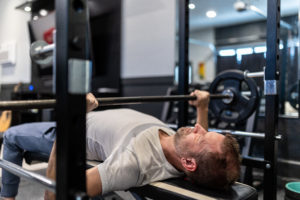
Finding The Calm
For most of the past two years, the Kuhns were working from their home, which also was occupied by their sons and Max’s girlfriend. Fueled by a desire for personal space and an affinity for do-it-yourself projects, David and Susie turned the garage into a family play and workout area, complete with a Ping- Pong table, dart board, gym equipment and home theater setup.
She says the boys weren’t in school or participating in sports and couldn’t go out to a movie or attend their beloved Gator football games.
“There was like a loneliness and the house felt like it was getting smaller. And there was this urgency to work out and maintain our health,” she recalls. “We had to get creative.”
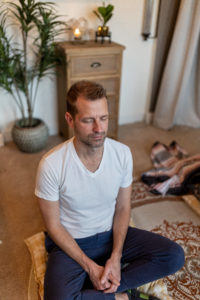
They made one room of their home a space for meditating. Susie discovered a knack for building and refurnishing furniture. They also discovered they make a pretty terrific team in the kitchen. “I think that too often people get lost on the quest for happiness and success and forget to be grateful for the present moment and the people we get to share it with,” Susie offers. “The best life is found in the kitchen with your family making dinner, in a wild game of Ping-Pong or in the moments where you see your child being a kind and good human to others.”
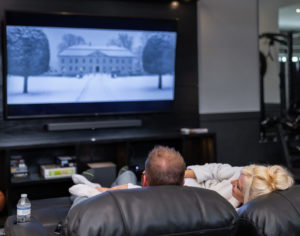
“Life was very out of balance for the first year of the pandemic. We were so deeply intertwined in roles we had never expected or anticipated we would be called upon to fill. What got me through it was that at the end of the day we had each other. I always had my best friend there with me to share a laugh or a cry or a glass of wine”, David says. “We have always had pretty healthy lifestyles but it really felt urgent to try to maintain a calm mind so we could improve upon our existing standards of healthy living. Playing all of these different roles during the pandemic was hard work, so we always tried to make it a priority to play as hard as we worked in the free moments that were lent to us and to rest when we were able to”.
David says that among the changes brought by the pandemic, Trinity Clinic, along with many medical practices, has evolved in how it functions.
“The clinic operates in a very cool way now. Our visits are a hybrid of telemedicine, curbside visits and in-office visits. Different patients want different things and the patients seem to appreciate having their healthcare needs met in more flexible ways than before and we have become more efficient in our ability to provide them with healthcare in ways I had never anticipated pre-pandemic,” he explains. “We have kept the safety of our practice, patients and our team as our top priority.”
He says one important tool in coping with the pandemic is gratitude.
“When so many have lost so much, you have to learn to be grateful for all that you have and it is very grounding,” he shares. “I believe living your best life means you are living your life on your own terms, surrounded by those you love. Lasting joy and fulfillment does not come from what you possess or the power that you wield, but rather from growing and giving.”






